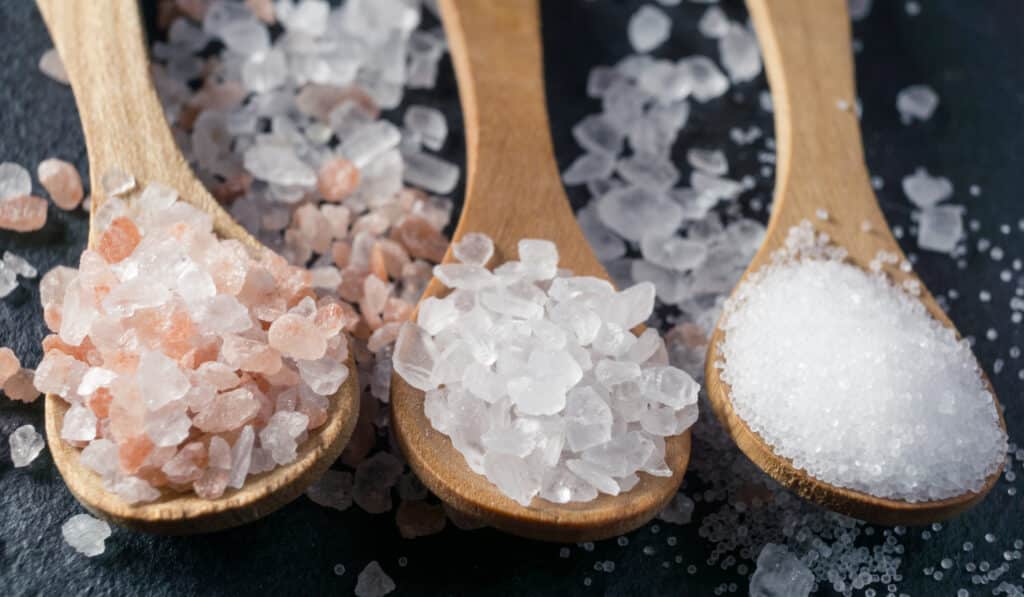The Facts of having Salt in Your Diet
This seems to be an age-old question when it comes to dieting and food. Should I salt my food or not? Does salt cause you to bloat? Are salt and sodium the same thing? All very good and interesting questions. Here’s the thing, social media, “diet gurus”, and unfortunately, some health organizations have given salt a bad rap. My hopes in this article are that it gives you a good, working definition of what salt is and whether is it healthy or not.
Salt and sodium are often used interchangeably. Salt is, in fact, sodium chloride. It’s made up of 40% sodium and 60% chloride. It’s a crystalized compound that is found abundantly in nature. It often has a variety of fortified iron, folic acid, and/or iodine. Sodium, however, is a mineral, and one half of the chemical makeup in salt. Sodium is essential for many body functions, including fluid balance, nerve impulses, nutrient absorption, and muscle function.
So, is it safe to say that all salt is sodium, but all sodium is not salt? Are you still confused? Yeah, me too. Let’s think of it like this. Sodium is found in foods. Especially highly processed foods. Salt is what we add to our food.

Let’s first clarify the difference between salt and sodium. There are several different types of salt. You have the good ol’fashion “Morton Iodized Salt” which is in most everyone’s home sitting on their kitchen table. Then you have the pink Himalayan salt, and the ever so sought-after black sea salt found in the deepest corners of the earth that cost an arm and a leg. Is this a real salt? I have no idea. Probably?! People will literally pay outrageous amounts of money if someone tells them it’s difficult to obtain. So, what is the most popular kind of salt used in a chef’s kitchen? Believe it or not, KOSHER SALT!
Most chefs use salt to help draw out moisture from meat. This is known as the “koshering” process. Salt is used to help preserve foods. This is why high amounts of salt can be found in canned goods, sauces, condiments, etc. Let’s put table salt into perspective. One teaspoon of table salt is equal to 2300mg of sodium. Considering our bodies only need about 500mg of sodium daily to carry out their natural functions, I think it’s safe to say that we are a bit salty.
If you can imagine how much salt you actually consume, it’s probably safe to say you consume more than 2300mg of salt a day. According to the Harvard School of Public Health, most Americans consume 3400 mg of salt a day! Way more than what our bodies actually need.
So, what does too much salt in your diet do? We know that too much salt can lead to bloating. But why? Sodium is an important electrolyte that is needed in our bodies. Like previously mentioned, sodium helps with nerve function and muscle contraction. It also helps keep our bodily fluids in a normal balance. Sodium is obtained from the foods we eat. We lose sodium through urination and sweating. Healthy kidneys help to manage this by maintaining a consistent balance between fluid and sodium. Too much sodium can shift the fluids into the bloodstream which then dilutes it. This is known as hypernatremia, high sodium.
When this happens blood volume is increased, hence, increasing blood pressure. High blood pressure, or hypertension, is the leading cause of heart failure, stroke, and other heart diseases. This is not an overnight ordeal. You just don’t suddenly wake up and have high blood pressure. This is years of improper dieting, kidney damage, etc. Symptoms that are associated with early hypertension are morning headaches, an irregular heartbeat, vision changes, feeling as though you can’t catch your breath, and many more. The good news? You don’t necessarily have to take medications. Pending doctor recommendations, you may be able to control it with proper diet.
However, we may have had our blood pressure too high for a while and now it’s time to help manage it with medications. That’s okay. Let’s first get it under control and then, with proper management and guidance, attempt to wean off the medications. It can happen! In the long run, hypertension can be controlled with proper exercise and specifically proper nutrition. When your blood pressure is controlled and maintained, your doctor may start decreasing the dosages and eventually take you off. But like I mentioned, listen to your doctor! DO NOT attempt to do this yourself as this can be very dangerous.
You just can’t cut the salt in your diet completely. It’s needed! There are different ways to obtain it. Most people do not get salt from simply “salting” their foods. It’s already in the foods we eat. Highly processed, fast foods make up 75% of a person’s sodium intake.
Here are some tips to help keep your sodium intake low:
- Eat foods that are naturally rich in sodium such as beets, celery, and spinach.
- When grocery shopping, look for foods that say “low sodium”
- When eating out, ask them to prepare it without salt.
- Quit eating highly processed, packaged foods. Instead enjoy a balanced diet that is naturally low in sodium such as vegetables, fruits, whole grains, and lean proteins. If you have read my previous articles, you know I am a huge fan of the Mediterranean diet.
Now that we have talked about having too much salt, what happens when you don’t get enough salt in your diet? This is known as hyponatremia, low sodium. Hyponatremia occurs mainly in older adults. This can be due to kidney failure, heart failure, medications (specifically diuretics), decreased water consumption, and many more reasons. This is usually seen in adults that live in a nursing facility or are currently hospitalized. Symptoms are altered mental status, lethargy, and in severe cases coma or seizures.
So, what’s the verdict? To salt or not to salt? Is salt in your diet healthy or not? Simply put…salt in your diet is essential. Eating too much or too little can carry serious health risks. Eating a balanced diet is the key. The American Heart Association recommends limiting your sodium intake to 2300mg or fewer a day. This is equal to about ¾ teaspoon of salt.
You may not know where to start. That’s okay. Finding a trusted nutrition guide can help. FFT Nutrition can help you with that. Their talented team of nutrition experts is able to provide weight loss and proper nutrition counseling to help you reach your goals. Don’t need to lose weight just want to eat better? They are able to provide information and guidance to simply be a better version of a healthier you!



